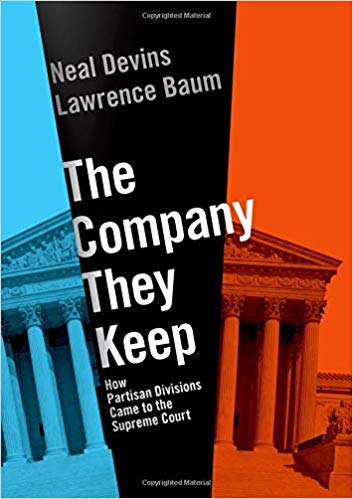Are Supreme Court justices swayed by the political environment that surrounds them? Most people think "yes," and they point to the influence of the general public and the other branches of government on the Court. It is not that simple, however.
As the eminent law and politics scholars Neal Devins and Lawrence Baum show in The Company They Keep, justices today are reacting far more to subtle social forces in their own elite legal world than to pressure from the other branches of government or mass public opinion. In particular, the authors draw from social psychology research to show why Justices are apt to follow the lead of the elite social networks that they are a part of. The evidence is strong: Justices take cues primarily from the people who are closest to them and whose approval they care most about: political, social, and professional elites. In an era of strong partisan polarization, elite social networks are largely bifurcated by partisan and ideological loyalties, and the Justices reflect that division. The result is a Court in which the Justices' ideological stances reflect the dominant views in the appointing president's party. Justices such as Clarence Thomas and Ruth Bader Ginsburg live largely in a milieu populated by like-minded elites. Today's partisanship on the Court also stems from the emergence of conservative legal networks such as the Federalist Society, that reinforce the conservative leanings of Republican appointees. For the Warren and Burger Courts, elite social networks were dominated by liberal elites and not divided by political party or ideology. A fascinating examination of the factors that shape decision-making, The Company They Keep will reshape our understanding of how political polarization occurs on the contemporary Supreme Court.
چکیده فارسی
آیا قضات دیوان عالی تحت تأثیر محیط سیاسی که آنها را احاطه کرده است؟ اکثر مردم فکر می کنند «بله» و به تأثیر عموم مردم و سایر شاخه های حکومت بر دیوان اشاره می کنند. با این حال، به این سادگی نیست.
همانطور که نیل دیوینز و لارنس باوم محققین برجسته حقوق و سیاست در شرکتی که نگه میدارند نشان میدهند، قضات امروز بسیار بیشتر به نیروهای اجتماعی ظریف در دنیای حقوقی نخبگان خود واکنش نشان میدهند تا فشار سایر شاخهها. دولت یا افکار عمومی توده ای بهویژه، نویسندگان از تحقیقات روانشناسی اجتماعی استفاده میکنند تا نشان دهند چرا عدالتخواهان مستعد پیروی از شبکههای اجتماعی نخبهای هستند که بخشی از آن هستند. شواهد قوی است: قضات در درجه اول از افرادی که به آنها نزدیک هستند و تایید آنها بیشتر اهمیت می دهند: نخبگان سیاسی، اجتماعی و حرفه ای سرنخ می گیرند. در عصر قطبی شدن شدید حزبی، شبکه های اجتماعی نخبگان عمدتاً توسط وفاداری های حزبی و ایدئولوژیک دوشاخه شده اند و قضات منعکس کننده این تقسیم بندی هستند. نتیجه دادگاهی است که در آن مواضع ایدئولوژیک قضات منعکس کننده دیدگاه های غالب در حزب رئیس جمهور منصوب کننده است. قضاتی مانند کلارنس توماس و روث بادر گینزبورگ عمدتاً در محیطی زندگی می کنند که با نخبگان همفکر پرجمعیت شده است. حزب گرایی امروزی در دادگاه همچنین از ظهور شبکه های حقوقی محافظه کار مانند جامعه فدرالیست نشات می گیرد که تمایلات محافظه کارانه منصوبان جمهوری خواه را تقویت می کند. برای دادگاههای وارن و برگر، شبکههای اجتماعی نخبگان تحت سلطه نخبگان لیبرال بودند و توسط حزب سیاسی یا ایدئولوژی تقسیم نمیشدند. بررسی جذاب عواملی که تصمیمگیری را شکل میدهند، شرکتی که نگه میدارند درک ما را از چگونگی دوقطبیسازی سیاسی در دادگاه عالی معاصر تغییر شکل میدهد.
ادامه ...
بستن ...
Ebook details:
عنوان: The Company They Keep: How Partisan Divisions Came to the Supreme Court
نویسنده: Neal Devins, Lawrence Baum
ناشر: Oxford University Press (February 6, 2019)
زبان: English
شابک: 0190278056, 978-0190278052
حجم: 14 Mb
فرمت: True Pdf
ادامه ...
بستن ...










